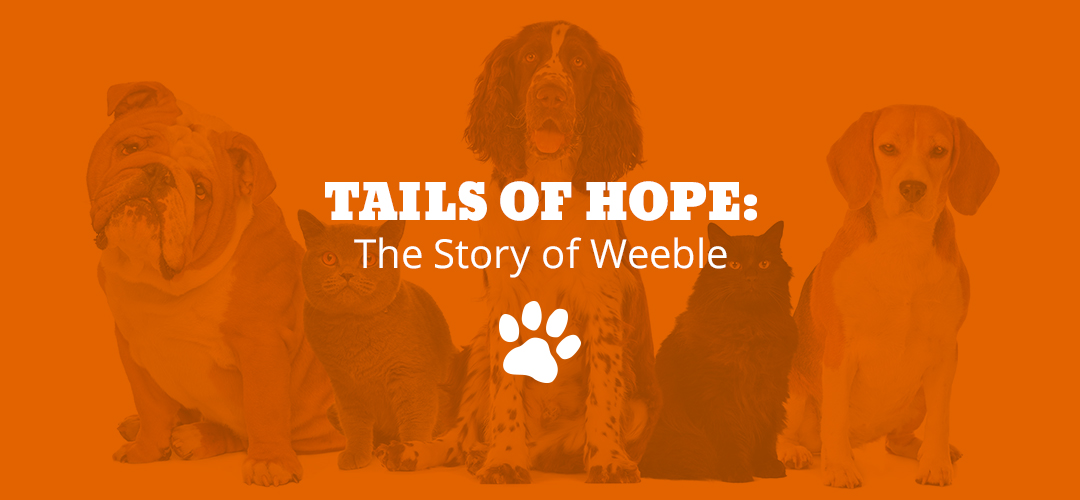A beautiful personality can overshadow even the biggest challenges. In Weeble’s case, his personality has won the hearts of the staff that has worked with him, turning his medical condition into merely a secondary attribute.
Weeble was brou ght to the Humane Society Animal Shelter by a good Samaritan who found him and feared for his safety. Weeble, who was estimated to be about 3 months old, was unable to walk. His head tremored to the extent his ability to eat was affected. Although he could find his food and begin to eat, he usually ended up with more on his face than in his tummy.
ght to the Humane Society Animal Shelter by a good Samaritan who found him and feared for his safety. Weeble, who was estimated to be about 3 months old, was unable to walk. His head tremored to the extent his ability to eat was affected. Although he could find his food and begin to eat, he usually ended up with more on his face than in his tummy.
Weeble seemed perfectly healthy otherwise. His weight was appropriate, he had a voracious appetite, and he was affectionate and comfortable with the staff.
Blood and stool testing showed no abnormalities for a kitten his age, so based on his symptoms, the doctors diagnosed him with Cerebellar Hypoplasia. This condition is caused by a virus called Feline Panleukopenia.
Feline Panleukopenia attacks the gastrointestinal system, causing vomiting, diarrhea, dehydration and a decrease in white blood cells.
The disease is passed from mother cat to her kittens in two ways: either she contracts Panleukopenia during pregnancy, or receives the Panleukopenia vaccine while she is pregnant. Though the kittens are not infected with the disease and do not become carriers, the virus attacks the kittens’ nerves in the part of the brain called the cerebellum. The cerebellum is responsible for the involuntary aspects of movement. Though kittens affected by Cerebellar Hypoplasia can walk, their ability to know when to step over a bump or walk down a step is affected. Many kittens with Cerebellar Hypoplasia will walk with their legs far apart, trying to maintain balance.
Cerebellar Hypoplasia is considered a non-progressive disorder, meaning it does not normally get worse. Cats with the disease require special accommodations, such as being kept indoors at all times, access to spill-proof water and food bowls, and protection from fall risks, such as stairs.
But cats with Cerebellar Hypoplasia can still enjoy a good quality of life, and their condition can improve. Weeble has made great strides. Though he has a tremor, Weeble is now able to chase a ball, and though he is still a messy eater, he is able to keep himself fed. He is very affectionate, tending to stay close to staff members’ legs as they are walking, and loves rubbing up against people. He is expected to have a fully, happy life.
Preventing the spread of Panleukopenia is possible. Keeping cats indoors, away from exposure to other cats, and having your cat vaccinated against the disease, will keep your cat protected from the virus. The Panleukopenia vaccine is part of the Feline RCP vaccine, or feline distemper vaccine, which is considered a vital vaccine by veterinarians, and is usually part of the kitten vaccine series.
Weeble is a playful, affectionate and sweet kitten, who loves to play games and be held. His purr can be heard feet away, and he loves to give kisses.
With his great personality, Weeble deserves a home with a companion who will spoil him and keep him entertained, as well as keep him safe. Come visit Weeble at the Humane Society of Macomb Animal Shelter and see how his personality shines!

